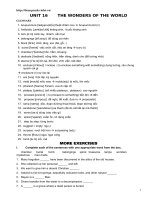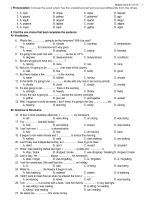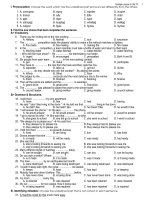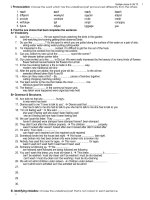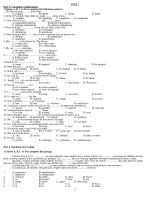test unit 7
Bạn đang xem bản rút gọn của tài liệu. Xem và tải ngay bản đầy đủ của tài liệu tại đây (125.9 KB, 5 trang )
<span class='text_page_counter'>(1)</span>Unit 7 – Television Part A – Vocabulary and Grammar. I/ Find the word with the different underlined sound. 1. 2. 3. 4. 5.. A. thirsty A. breathe A. then A. birthday A. everything. B. throw B. fourth B. thing B. mouthful B. rhythm. C. theme C. tooth C. them C. although C. healthy. D. there D. warmth D. their D. worth D. nothing. II/ Choose the right word from the box for each definition.. 1. 2. 3. 4. 5. 6. 7. 8.. comedian TV schedule MC reporter film producer cartoon character A room where they film different shows is a . A person who acts in a comedy is a . A book which gives you information on TV programmes is a A person who produces a film is a . An animated animal whch appears in a cartoon is a A person who hosts an event is an . A person who reports news is a . A long film which is broadcast in short parts is a .. TV series studio. . .. III/ Circle the odd word in each group. 1. 2. 3. 4. 5.. A. documentary A. weatherman A. television A. viewer A. schedule. B. show B. actor B. newspaper B. audience B. screen. C. comedy C. writer C. radio C. on-looker C. remote control. D. cartoon D. newsreader D. telephone D. reporter D. antenna.
<span class='text_page_counter'>(2)</span> IV/ Match the questions with the answers. 1. 2. 3. 4. 5.. Questions What is your favourite type of TV programme? What time is Weekend Meeting on? Why are children trusting? How often do you watch The Kids Are All Right? Where is the studio of Vietnam’s national TV station?. Answers a. Because they don’t tell lies. b. Cartoons. c. Only once a week. d. In Ha Noi. e. At 8 o’clock on Saturday..
<span class='text_page_counter'>(3)</span> Unit 7 – Television Part B – Listening. I/ Listen and answer the questions. 1. Why is television good? 2. What can kids learn from TV? 3. What part of the body does watching too much TV harm? 4. What does watching too much TV keep children from? II/ Listen and tick the correct channel for each programme. PROGRAMME. CHANNEL 1. CHANNEL 2. Music: Green Green Summer Cartoon: The Red Spotted Squirrel Film: The Lonely Giraffe Home and Garden: How to Make a Dog House Our World: The Old Town of Inca III/ Listen again and tick statements 1-5 with T for true and F for false. 1. 2. 3. 4. 5.. Statements The first programme starts at seven-thirty. There are two programmes starting at the same time. The Red Spotted Squirrel lasts forty-five minutes. The Lonely Giraffe finishes at ten o’clock. The Old Town of Inca is in India.. T. F. CHANNEL 3.
<span class='text_page_counter'>(4)</span> Unit 7 – Television Part C – Reading. Read the schedule for Around the World channel and do as direction. TIM E. PROGRAMME. 8:00. Animals: Life in the Water. DESCRIPTION. A documentary about the colorful living world in the Pacific 9:00 Comedy: The Parrot Instructor Have lots of fun with the Parrot Instructor and his first working day at the skating rink 10:3 Sports: Wheelbarrow Races Four houses at the Wicked chool complete in 0 the most exciting race. Who wins? 11:0 Gameshow: Children are Always The game show this week will test your 0 Right knowledge about the Amazon jungle. 12:1 Science: Journey to Jupiter Discover strange facts about a planet in our 5 system I/ Answer the following questions about the schedule. 1. What is the event in the Sports programme today? 2. What’s the name of the comedy? 3. Can we watch a gameshow after 11 o’clock? 4. What is the content of the Animals programme? 5. Is Jupiter the name of a science programme? II/ Read the information about the people below and choose the best programme for each. PEOPLE. 1. Phong likes discovering the universe. 2. Bob likes programmes that make him laugh. 3. Nga loves learning through games and shows. 4. Minh likes watching sports events. 5. Linh is interested in ocean fish.. PROGRAMME.
<span class='text_page_counter'>(5)</span> Unit 7 – Television Part D – Writing. Use the conjunction at the end of each group to connect the sentences. 1. We turned to The Movie Channel. We wanted to watch Pinocchio. (because) 2. You can watch The Pig Race. You can watch Who’s Faster. (or) 3. I am interested in the history of television. I’ve read a lot of books about it. (so) 4. I love films. I don’t like watching them on television. (but) .
<span class='text_page_counter'>(6)</span>
